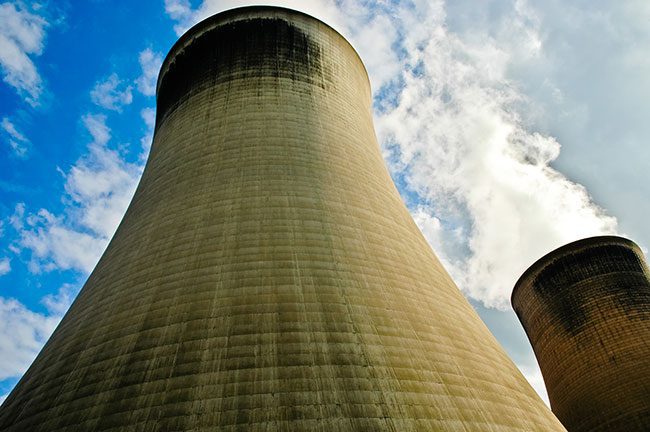What You Should Know About Cooling Towers

When you hear the term cooling tower, what comes to your mind is the tall cylindrical tower that’s found in nuclear power plants and is wide at the base. However, cooling towers are not only found in nuclear plants, but also in different industries as part of the cooling system. This specialized device ensures that the system functions properly by preventing possible overheating which could bring the whole system to a halt.
How a Cooling Tower Works
As the name suggests, the cooling tower is used to cool down the water circulating in the system. A series of fans pull large volumes of air into the cooling tower. The air is then brought into direct contact with the heated water from the condenser. A slight amount of the water evaporates when it comes into contact with the air and this creates a cooling action. The cooling tower then pumps the cooled water to the process equipment or condenser.
Types of Cooling Towers
Natural Draft Cooling Towers
This type of cooling tower depends on natural convection to circulate air inside the tower and cool the water. The natural draft cooling towers are based on the ideology that warm, moist air rises above dry, cooler air, thus creating a constant air flow.
Mechanical Draft Cooling Cowers
Mechanical draft cooling towers, unlike natural draft cooling towers, employ mechanical methods to circulate air inside the tower. This is through the use of propeller fans or centrifugal fans. Compared to the natural draft cooling towers, mechanical draft cooling towers can be placed inside a building and is more advantageous since the flow of air can be regulated. However, they are more costly to run.
Common Applications of Cooling Towers
1. Water-cooled air-conditioning systems in hotels, hospitals, government premises, commercial complexes and residential areas.
2. Electrical power generation plants
3. Oxygen plants
4. Refrigeration plants
5. Milk and dairy plants
6. Induction heating steel furnace
7. Hydraulic oil coolers
8. Biogas plant and renewable power plants
9. Injection molding machines
Industries That Utilize Cooling Towers
1. Steel plants/ Metal casting plants
2. Oil refineries and manufacturing
3. Food and food processing industries
4. Car and vehicle manufacturing industries
5. Dairy product processing industries
6. Chemical and petrochemical industries
7. Solvent extraction plant
8. Solar power plant
Cooling Towers Designs
The term cooling tower is used to refer to both open circuit (direct) and closed circuit (indirect) cooling equipment. These two systems operate to bring the same effect and therefore it is important for you to understand how they work and what makes them different.
Open Circuit Cooling Towers
This design involves the distribution of warm water into a fill. At this point, the fill provides an increased surface area for the air-water contact and thus allows for maximum evaporation to take place. After evaporation, the cold water is collected into a basin and returned to the condenser to repeat the process all over again. The heated air is then discharged to the atmosphere in a way that prevents it from getting back to the cooling tower.
Closed Circuit Cooling Towers
In this design, there is no direct contact between the air and the fluid being used, which can either be water or glycol mixture. The system has two fluid circuits whereby, one is used to bring in the warm water and the other one is a tube bundle. Water that passes through the tube bundle is cooled by a fan that blows air over the tubes and this facilitates heat exchange.
Cooling towers come in different sizes and are made of different types of materials such as stainless steel, wood, and plastic. It is no doubt that galvanized, stainless steel is all you need if you want a piece of equipment with long-term durability. If you want the best cooling tower that will suit your needs and improve your business, then the best place to get this is at Swanton Welding Company Inc.
For your heavy fabrication project, please do not hesitate to contact us at 419-826-4816 or email us at info@swantonweld.com.

